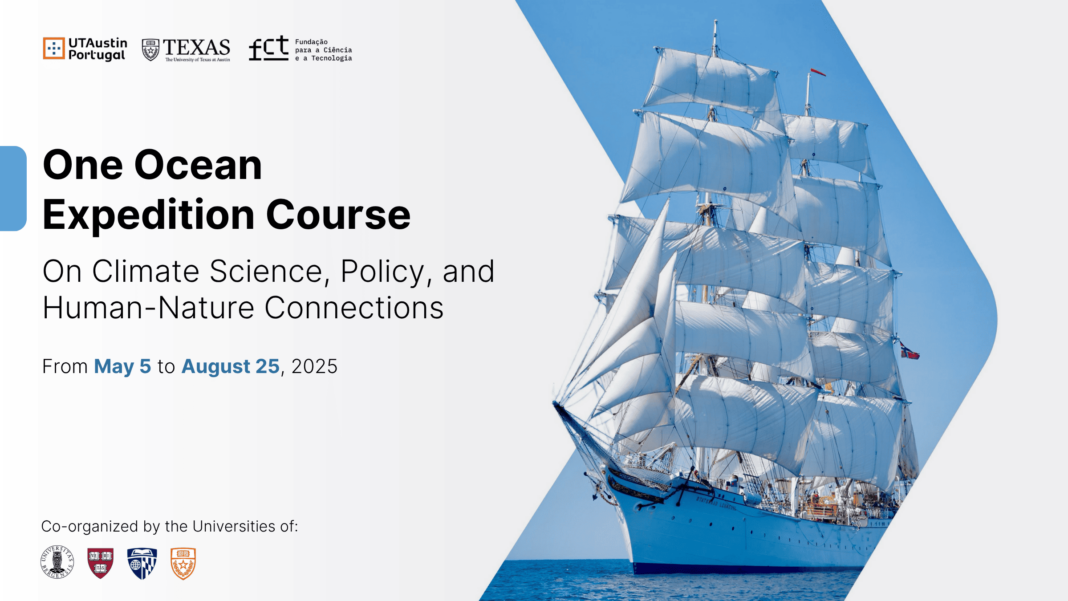Eight brilliant minds, One bold voyage. Endless potential.
The UT Austin Portugal Program is proud to support the participation of eight exceptional individuals affiliated with Portuguese institutions in the ongoing One Ocean Expedition, an immersive Course on Climate Science, Policy, and Human-Nature Connections. The journey began in Ponta Delgada, Azores, for a three-day workshop and the group is now underway aboard the tall ship Statsraad Lehmkuhl for a remarkable transatlantic research expedition.
This initiative runs from May through August 2025 and is co-organized by the University of Bergen, Harvard University, Johns Hopkins University, and The University of Texas at Austin. The course is designed for Master’s and PhD students who seek a deep and interdisciplinary understanding of the climate challenges our oceans face and how science, policy, and cultural perspectives can work together to address them.
As part of its commitment to advancing research and innovation,the UT Austin Portugal Program, through its Space-Earth Technologies area and as part of its Training Academy initiative, is providing financial assistance for selected Portuguese students. Each participant receives full boarding on the ship and has the opportunity to apply for additional support to help cover travel and on-land accommodation costs. These eight participants were chosen after a competitive call earlier this year, which closed in February.
The Atlantic to the Arctic: A Floating Classroom
The journey itself is unlike any other. From July 8 to 29, students will sail from the volcanic coastline of the Azores to the icy expanse of Nuuk, Greenland. Along the way, they will engage in workshops, collaborate in interdisciplinary teams, and contribute to research projects focusing on ocean governance, energy systems, biodiversity, indigenous knowledge, and sustainable transitions.
The ship, Statsraad Lehmkuhl, is a Norwegian barque built in 1914 and recently outfitted with cutting-edge scientific instrumentation. It is one of the official ambassadors for the UN Decade of Ocean Science for Sustainable Development. Throughout this mission, it serves both as a vessel for physical transport and as a symbol of global collaboration on ocean science.
The July leg from the Azores to Greenland is part of the broader One Ocean Expedition 2025–2026: a year-long global voyage to raise awareness of the ocean’s role in building a more sustainable future. The expedition will reach 27 ports across three continents bringing together communities through public events, data collection campaigns, and onboard educational activities.
Why It Matters/The Broader Impact
Climate change is not a problem with simple solutions, it crosses scientific, political, social, and ethical boundaries,requiring a united, interdisciplinary response that reflects the complexity of the world it affects. The One Ocean course brings these dimensions together in a format that combines virtual lectures (which ran from May to June), hands-on research during the ship journey, and a concluding set of workshops and reports due by the end of August.
Students are not only learning about climate policy and marine science. They’re also learning how knowledge is built from natural sciences to indigenous perspectives, and how that knowledge can be translated into action. The fieldwork immerses students in marine biodiversity, systems thinking in ecological models, policy mapping, and participatory learning in a truly international setting.
Participants will earn 10 ECTS credits, and the course operates on a pass/fail basis. The experience is expected to have a lasting impact on their academic and professional paths, encouraging future collaborations and strengthening international networks across disciplines and geographies.
A Portuguese Voice in Global Innovation
For the UT Austin Portugal Program, supporting this mission goes far beyond sending students overseas. It reflects a broader commitment to interdisciplinary learning and global collaboration in addressing planetary challenges. By embedding Portuguese students into this high-profile expedition, the Program is helping to elevate national expertise and positioning Portugal as an active contributor to climate solutions and ocean stewardship.
Several of the supported participants are already engaged in national or European R&D projects aligned with UT Austin Portugal’s scientific areas, particularly within Space-Earth Technologies and Climate Science. Their involvement on board is expected to deepen those connections and open doors for new joint initiatives.
As the ship departs the Azores on July 8, these eight students will carry with them the responsibility of representing their institutions and country in an ambitious, multi-institutional experiment in immersive, transdisciplinary education.
Updates from the voyage will be shared over the coming weeks. The UT Austin Portugal Program team in Austin and Portugal are committed to supporting participants throughout their journey , highlighting their experiences, and promoting the outcomes of this unique journey.
Stay tuned as we follow their progress, across the ocean, through scientific dialogue, and into a shared future where knowledge, connection, and courage will help shape the course of climate action.

